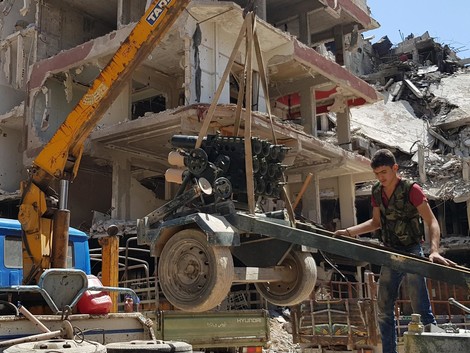Your podcast discovery platform
Curious minds select the most fascinating podcasts from around the world. Discover hand-piqd audio recommendations on your favorite topics.

piqer for: Boom and bust Global finds
I am a Dutch journalist, writer and photographer and cover topics such as human rights, poverty, migration, environmental issues, culture and business. I’m currently based in The Hague, The Netherlands, and frequently travel to other parts of the world. I have also lived in Tunisia, Egypt, Kuwait and Dubai.
My work has been published by Al Jazeera English, BBC, The Atlantic's CityLab, Vice, Deutsche Welle, Middle East Eye, The Sydney Morning Herald, and many Dutch and Belgian publications.
I hold an MA in Arabic Languages and Cultures from Radboud University Nijmegen and a post-Master degree in Journalism from Erasmus University Rotterdam. What I love most about my work is the opportunities I get to ask loads of questions. Email: [email protected]
War And The Truth
In this story for the UK paper The Independent, Middle East correspondent Robert Fisk writes about his visit to Douma.
Earlier this month, news reached us that another chemical attack had taken place in Syria, in a city close to Damascus this time. Probably more than 34 people were killed and many more were injured. A week later, the United States, France and the United Kingdom launched airstrikes against Syrian government targets in response to the attack.
Fisk talks to Dr Rahaibani, "a friendly doctor in a green coat", whom he finds in "his subterranean clinic". He tells him the victims didn't die by gas but by oxygen starvation.
[….] readers should be aware that this is not the only story in Douma. There are the many people I talked to amid the ruins of the town who said they had "never believed in" gas stories - which were usually put about, they claimed, by the armed Islamist groups.
Fisk was one of the few Western journalists to visit Douma after the attack. His article has so far been shared 53K times on social media. Of course, it's interesting to read a story by someone on the ground, an award-winning journalist who has lived in the region for more than 40 years.
However, Dr Rahaibani isn't an eyewitness. The others Fisk spoke to aren't either.
And for some reason, the Syrian government gave Fisk access to Douma days before the Organisation for the Prohibition of Chemical Weapons (OPCW) finally received the permission to take samples.
I don't know how much time Fisk spent in Douma exactly, but I can imagine it's not easy to "search for truth in the rubble of Douma", especially not in a short time.
So far since 2013, Human Rights Watch has documented 85 chemical weapons attacks in Syria. Hopefully, the OPCW will soon be able to find out if it was gas or no gas this time. And we'll know again whether "the first casualty of war is truth".
In any case, sadly, again some dozens of people have died too early – just like more than half a million Syrians.
